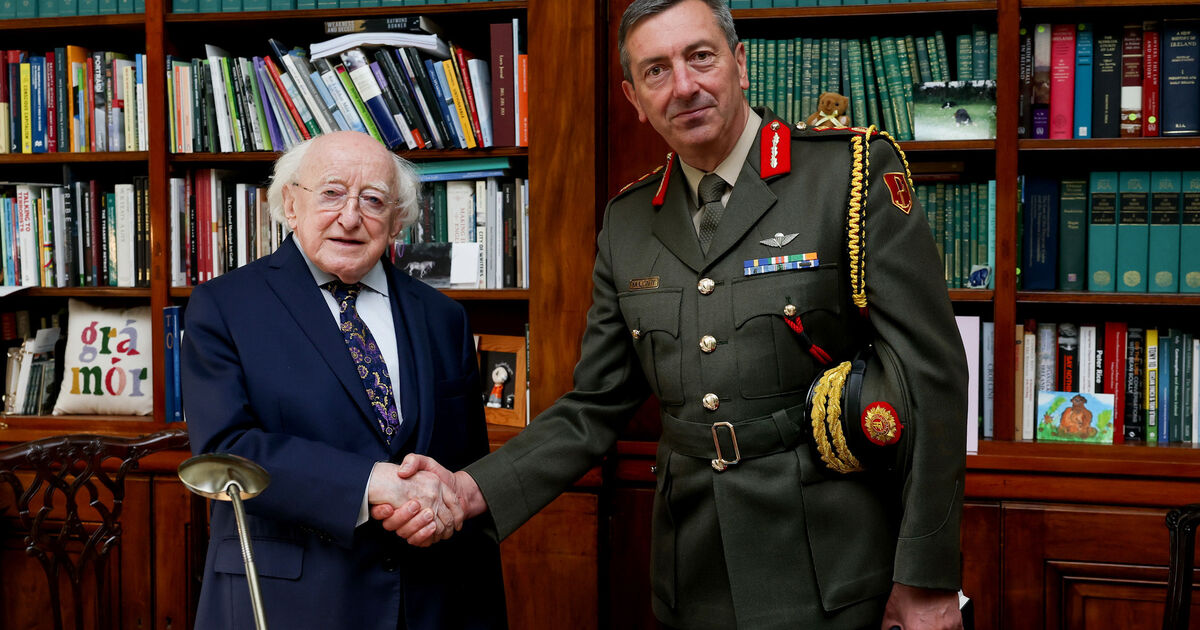The new Defence Forces Chief of Staff, Lieutenant General Rossa Mulcahy, said Gaza or Ukraine could potentially be options but pointed out that any mission has to have the consent of the host nation or warring parties and the authorization of the UN, Nato or the EU.
He said the Defence Forces was like the “Swiss Army knife of the State” in overseas deployments, from securing headquarters to “ground holding”, like in Lebanon.
He said the decision to dispose of Unifil — as set out in a draft resolution for a phased ending of Unifil by December 2027 — was “not welcome”, but said it was an improvement on the August 2026 deadline initially sought by Israel and US.
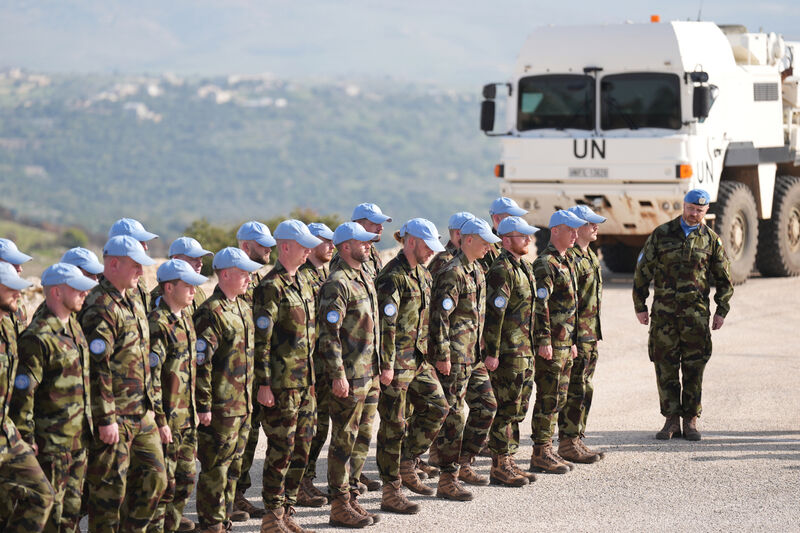 Irish Defence Forces troops serving with the Unifil peacekeeping mission on parade at Camp Shamrock near the border between Lebanon and Israel earlier this year.
Irish Defence Forces troops serving with the Unifil peacekeeping mission on parade at Camp Shamrock near the border between Lebanon and Israel earlier this year.
Tánaiste, Minister for Foreign Affairs and Minister for Defence, Simon Harris, said there was a “significant chance” in recent weeks the mission could have ended immediately without a renewal of the mandate, describing that scenario as “extraordinarily dangerous”.
He said a “diplomatic campaign”, involving Ireland, France, Austria, Italy and Lebanon, together with “constructive engagement” with the US, had achieved a “much improved” timeframe for withdrawal.
Lt Gen Mulcahy said Ireland’s involvement in Unifil since 1978 provided the Defence Forces with an “operational test bed” where officers and soldiers learn how to “conduct operations in an operational environment”.
Speaking on the Pat Kenny show on Newstalk, the chief of staff said this experience includes mine-clearance, engaging with local people, conducting patrols, and overcoming operational difficulties.
Lieutenant Colonel Conor King, general secretary of Raco, the staff association representing officers, said Unifil, and overseas deployments generally, provide soldiers with operational experience that “cannot be replicated at home”.
He said it was “crucial for recruitment and retention” to maintain a significant overseas presence.
Professor Ray Murphy of the Irish Centre for Human Rights in Galway, and former Unifil officer in the 1980s, said the decision was “a major setback for Irish participation in UN peacekeeping operations”.
He said it “will not be easy” to find a suitable replacement.
Rory Finegan, deputy director at the Centre for Military History & Strategic Studies in Maynooth University, who also served in Unifil as a platoon commander, said the development was “quite literally, for Ireland, an end of an era”.
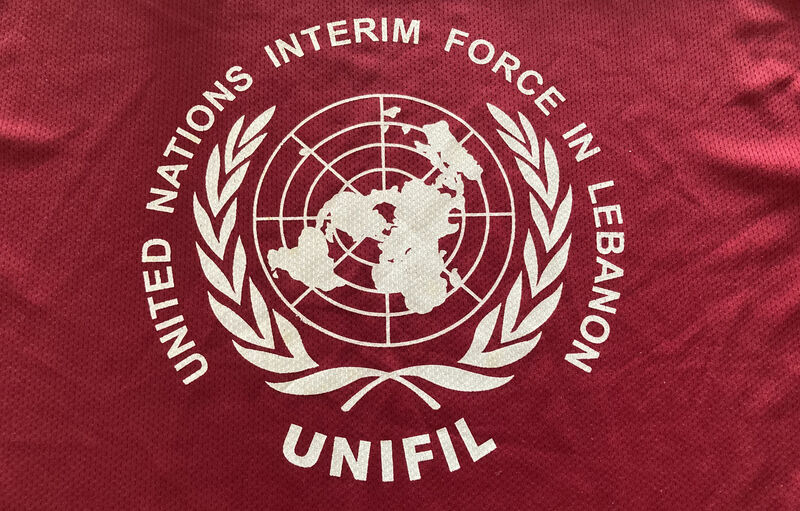 The UN Interim Force in Lebanon (Unifil) logo on T-shirts worn by some members of the Irish Defence Forces while serving in Lebanon. Picture: Derek Farrell/Rolling News
The UN Interim Force in Lebanon (Unifil) logo on T-shirts worn by some members of the Irish Defence Forces while serving in Lebanon. Picture: Derek Farrell/Rolling News
He said it will have “major implications, not only for morale, but the operational experience” of Irish troops, describing Unifil as a “veritable crucible”.
Mervyn O’Driscoll, a senior lecturer at the School of History at University College Cork, said the “status quo logic” in the Irish government and elsewhere has been that Unifil should remain in “damage-control mode” since there has never been a consensus at the UNSC level to grant Unifil the power to fulfil its mandate.
Lt Gen Mulcahy said Unifil would now end its mission in December 2026 and then, within a further year, withdraw all its forces.
He said more than 30,000 Irish troops had served in Unifil during its 47 years, including all three services — the army, air corps, and naval service — but predominantly the army.
He said while Irish numbers had reduced over time, there were now 343 personnel in the Irish/Polish Battalion. He told Newstalk:
It was an operational test-bed to train young leaders and soldiers in how to conduct operations in an operational environment.
He said Defence Forces ordnance and engineers gained huge expertise, including in mine clearance.
He said the organisation had lost 47 personnel over there and one member in the separate observer group UNTSO in South Lebanon (which remains unaffected).
Lt Gen Mulcahy said the ending of Unifi was a “big challenge” and posed a “reset” of Defence Forces contribution abroad, influenced by the new capabilities under the investment level being implemented by the Government.
Raco leader Lt Col Conor King said it was “hugely important” for recruitment and retention to maintain a significant presence overseas.
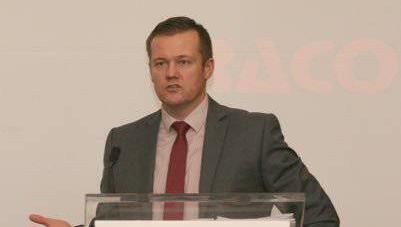 Conor King, the general secretary of Raco, the Representative Association of Commissioned Officers.
Conor King, the general secretary of Raco, the Representative Association of Commissioned Officers.
Pointing to a continuous presence in such missions since 1958, he said:
Unifil and overseas deployments in general provide soldiers with operational experience that cannot be replicated at home, as well as training in diplomacy, negotiation, and cross-cultural communication.
“It will be crucial for recruitment and retention for the DF [Defence Forces] to maintain a significant presence overseas through the identification of other peace keeping or enforcement missions by government once the Unifil mission begins to draw down.”
He added though that one of the barriers to overseas participation was remuneration, which, he said, has not kept pace with inflation or cost of living increases, and “no longer compensates” for the additional burdens of family separation, and additional costs such as childcare.
Prof Ray Murphy said the decision was “a major setback” for Irish participation in UN peacekeeping operations and added that “it will not be easy to find a suitable alternative”.
He said it was “far from certain that a reconfigured peacekeeping force could continue” to operate in south Lebanon without the legitimacy, limited protection and support that a UN resolution provided.
“Apart from the question of who would finance such a force, it would be even more challenging to agree a mandate and ensure co-operation from the various parties on the ground,” he said.
“Previous multinational forces deployed in Lebanon in the 1980s sustained significant casualties.
“Even with the removal of the so-called ‘triple lock’ requiring UN approval for Irish participation, continued participation in a non-UN approved mission in the future would present many challenges for Ireland.”
Rory Finegan said the imminent end of Unifil was in a sense the “inevitable conclusion predicated on the machinations of Great Power Politics at the UN Security Council”.
He said: “Throughout our involvement in the mission some 15 of our troops were killed directly in the line of fire, while others died in accidents. It was and remains a heavy price.”
He said Unifil’s ability to maintain the status quo in Lebanon was “always fraught with difficulty” given the activities of Hezbollah, Israel and Syria in the country.
He said it should be remembered that the observer mission UNTSO — which has several Irish Defence Forces personnel — will continue to serve, as its mandate does not require to be renewed annually.
“For the Defence Forces it means that we now have no major mission to send a significant cohort of troops, having withdrawn from the UNDOF mission in the Golan Heights in April 2024.
“This has implications for not only morale, but the operational experience of our troops in which Unifil had been the veritable crucible.
“The end of Unifil therefore is quite literally for Ireland the end of an era. This author served twice there as a young platoon commander.”
Mervyn O’Driscoll of the School of History at University College Cork said UNSC 1701 was not working as intended, but added that this “is not the fault of Unifil”, which, he said, cannot implement its mandate to secure the withdrawal of armed forces from South Lebanon. He said:
Unifil cannot disarm Hezbollah, which has become part of Lebanon’s coalition government.
“Hezbollah is referred to as a ‘state within a state’ with an autonomous army, distinct from the Lebanese army.”
He said it was “a supreme paradox” that, under Resolution 1701, Unifil relies on the Lebanese government to enforce its mandate.
“That very government tolerates Hezbollah to sustain the coalition,” he said.
“Despite the government not condoning Hezbollah’s actions (rockets into Israel, etc) and calling for restraint, Beirut will not intervene in southern Lebanon, as that would destabilise the entire political artifice of Lebanon.”
Mr O’Driscoll said that, in effect, that has left Unifil as a buffer in southern Lebanon, unable to demilitarise the region as per 1701 and instead seeks to minimise conflict and provide external oversight to limit clashes between Hezbollah and Israel.
“Unifil is caught in a frustrating catch-22 situation. Its stuck in the middle in an on-off again asymmetric conflict between Hezbollah and the IDF,” he said.
“When Unifil leaves, Tel Aviv will have a freer hand to demilitarise Southern Lebanon, which it argues should already have been achieved by Unifil under resolution 1701.”
Mr O’Driscoll said the “status quo logic” in the Irish government and elsewhere has been that Unifil should remain in “damage control mode” since there has never been a consensus at the UNSC level to grant Unifil the power to fulfil its mandate.
“The concern is what will happen when Unifil withdraws completely,” he said.
“Additional time has been bought, but it is a house of cards that is running out of time.”
Speaking on RTÉ Radio One, Mr Harris said there were mixed emotions about the UN Security Council resolution, saying there was a “significant chance” in recent weeks the mission could have been ended immediately without a renewal of the mandate.
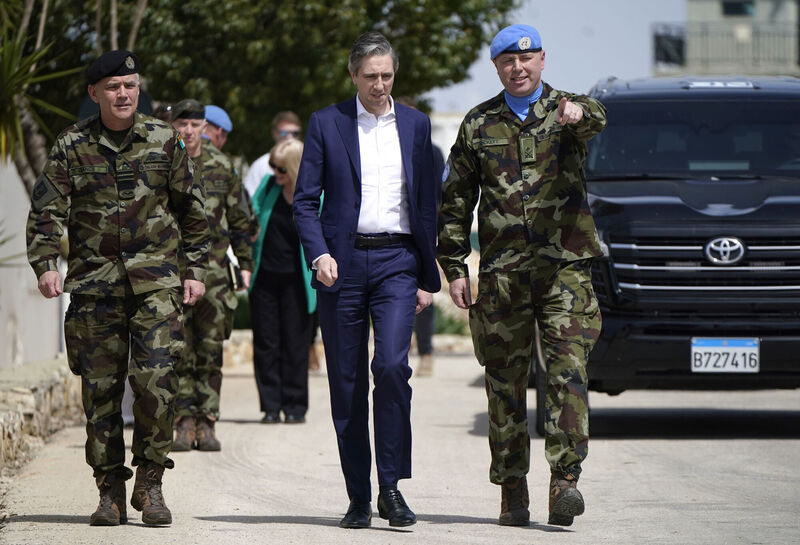 Tánaiste and defence minister Simon Harris on a visit to Camp Shamrock near the Israel-Lebanon border with then chief of staff Lt General Sean Clancy (left) and battalion commander Lt col Shane Rockett (right) earlier this year. Picture: Niall Carson/PA
Tánaiste and defence minister Simon Harris on a visit to Camp Shamrock near the Israel-Lebanon border with then chief of staff Lt General Sean Clancy (left) and battalion commander Lt col Shane Rockett (right) earlier this year. Picture: Niall Carson/PA
Mr Harris said that, while he would not speak for the US, they had outlined views against the mission, highlighting cost concerns.
“I must say we did have constructive engagement with the US, and I think we saw the benefit of countries working together, of France, of Austria, of Ireland, of Italy, of Lebanon itself,” Mr Harris said.
Mr Harris said UN officials told US officials while they had a perspective, it would be “an extraordinarily dangerous situation to have an abrupt end, an abrupt cliff edge to a peacekeeping mission in a very volatile part of the world”.
The Tánaiste added there was a new Lebanese Government in place and they were “extremely serious” about trying to disarm Hezbollah and to give people in Lebanon a “new start”.
“The idea that we, the international community, the peacekeepers of the world, would walk away at this moment would have been wholly, wholly irresponsible,” Mr Harris said.
“The diplomatic campaign has gotten us to a much improved situation. If they say a week is a long time in politics, trying to predict with certainty where we’ll be by the middle or end of 2027, is a very, very challenging thing to do.”
Mr Harris said the mission has not been in place for too long, while condemning the “pain and misery” inflicted by Hezbollah on the people in Lebanon and Irish peacekeepers serving there. The Tánaiste and defence minister added:
I think what is important now though is that we don’t turn our back on Lebanon.
He said that, despite the winddown of the mission, there would still be opportunities for people to serve on peacekeeping missions abroad.
“Come what may, Irish people will continue to serve in Óglaigh na hÉireann in overseas missions and there will be other opportunities to serve with distinction in the name of peace.
“We’ve seen troops serve in other parts of the world in the past and we’re going to see that again in the future.
“We remain very committed to peacekeeping in Ireland and in the Defence Forces.”

